
The Phantom Empire is a 1935 American Western serial film directed by Otto Brower and B. Reeves Eason and starring Gene Autry, Frankie Darro, and Betsy King Ross. This 12-chapter Mascot Pictures serial combined the Western, musical and fantasy genres. The first episode is 30 minutes, the rest about 20 minutes. The serial film is about a singing cowboy who stumbles upon an ancient subterranean civilization living beneath his own ranch that becomes corrupted by unscrupulous greedy speculators from the surface. In 1940, a 70-minute feature film edited from the serial was released under the titles Radio Ranch or Men with Steel Faces. This was Gene Autry's first starring role, playing himself as a singing cowboy.
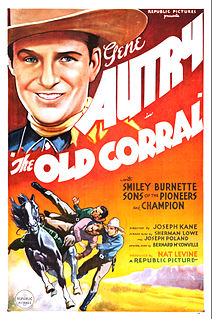
The Old Corral is a 1936 American Western film directed by Joseph Kane and starring Gene Autry, Smiley Burnette, and Irene Manning. Based on a story by Bernard McConville, the film is about a sheriff of a small western town who sings his way into a relationship with a singer from a Chicago nightclub who earlier witnessed a murder. The supporting cast features Lon Chaney Jr. and Roy Rogers.

Oh, Susanna! is a 1936 American Western film directed by Joseph Kane and starring Gene Autry, Smiley Burnette, and Frances Grant. Written by Oliver Drake, the film is about a cowboy who is robbed and then thrown from a train by an escaped murderer who then takes on the cowboy's identity.

Springtime in the Rockies is a 1937 American Western film directed by Joseph Kane and starring Gene Autry, Smiley Burnette, and Polly Rowles. Written by Gilbert Wright and Betty Burbridge, the film is about a ranch owner who brings a flock of sheep into cattle country and faces the opposition of local ranchers with the help of her ranch foreman.
Round-Up Time in Texas is a 1937 American Western film directed by Joseph Kane and written by Oliver Drake. The film stars Gene Autry, Smiley Burnette, and Maxine Doyle. Despite its title, the majority of the film takes place in South Africa.

Man from Music Mountain is a 1938 American Western film directed by Joseph Kane and starring Gene Autry, Smiley Burnette, and Carol Hughes. Written by Betty Burbridge and Luci Ward, based on a story by Bernard McConville, the film is about a singing cowboy who fights corrupt land developers who try to cheat honest ranchers who are unaware of the gold lying beneath their land.
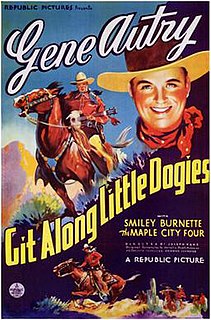
Git Along Little Dogies is a 1937 American Western film directed by Joseph Kane and starring Gene Autry, Smiley Burnette, and the Maple City Four. Written by Dorrell and Stuart E. McGowan, the film is about a singing cowboy who gets caught up in a war between oilmen and cattle ranchers, taking the side of the ranchers until he learns that oil will bring a railroad to town. The film is also known as Serenade of the West in the United Kingdom.

Home on the Prairie is a 1939 American Western film directed by Jack Townley and starring Gene Autry, Smiley Burnette, and June Storey. Written by Charles Arthur Powell and Paul Franklin, the film is about a cattle inspector's efforts to prevent a corrupt cattle rancher from shipping to market a herd of cattle infected with hoof and mouth disease.

The Sagebrush Troubadour is a 1935 American Western film directed by Joseph Kane and starring Gene Autry, Barbara Pepper, and Smiley Burnette. Written by Oliver Drake and Joseph F. Poland, the film is about two Texas Rangers traveling undercover as western troubadours in search of the killer of an old, half-blind man.

Guns and Guitars is a 1936 American Western film directed by Joseph Kane and starring Gene Autry, Smiley Burnette, and Dorothy Dix in her final film appearance. Written by Dorrell and Stuart E. McGowan, the film is about a singing cowboy who helps protect a county from fever-ridden cattle, and after being framed for murdering the sheriff, proves his innocence, gets elected sheriff, and then goes after the bad guy.
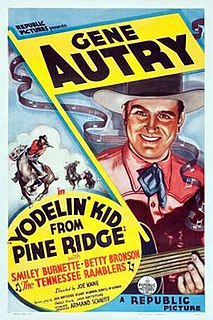
Yodelin' Kid from Pine Ridge is a 1937 American Western film directed by Joseph Kane and starring Gene Autry, Smiley Burnette, and Betty Bronson. Based on a story by Jack Natteford, the film is about the son of a Southeastern cattleman who becomes entangled in a war between the cattlemen and "turpentiners" who make their living harvesting pine tree sap.

Boots and Saddles is a 1937 American Western film directed by Joseph Kane and starring Gene Autry, Smiley Burnette, and Judith Allen. Based on a story by Jack Natteford, the film is about a young Englishman who inherits a ranch that he wants to sell, but is turned into a real Westerner by a singing cowboy.

Mexicali Rose is a 1939 American Western film directed by George Sherman and starring Gene Autry, Smiley Burnette, and Noah Beery. Based on a story by Luci Ward and Connie Lee, the film is about a singing cowboy who fights corrupt oil men selling worthless stock from a non-existent well located on land belonging to a poor Mexican orphanage.
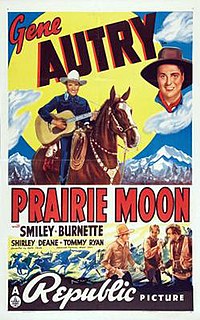
Prairie Moon is a 1938 American Western film directed by Ralph Staub and starring Gene Autry, Smiley Burnette, and Shirley Deane. Written by Betty Burbridge and Stanley Roberts, the film is about a singing cowboy who takes care of three tough boys sent west from Chicago after their father dies and leaves them a cattle ranch.
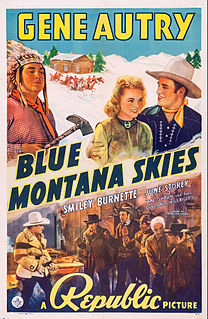
Blue Montana Skies is a 1939 American Western film directed by B. Reeves Eason and starring Gene Autry, Smiley Burnette, and June Storey. Based on a story by Norman S. Hall and Paul Franklin, the film is about a singing cowboy who goes up against a gang of fur smugglers operating near the Canada–United States border.

Colorado Sunset is a 1939 American Western film directed by George Sherman and starring Gene Autry, Smiley Burnette, and June Storey. Written by Betty Burbridge and Stanley Roberts, based on a story by Luci Ward and Jack Natteford, the film is about a singing cowboy and his buddies who discover that the ranch they bought is really a dairy farm—and worse, it's subject to intimidation from a protection racket that prevents dairy products from safely reaching the market.
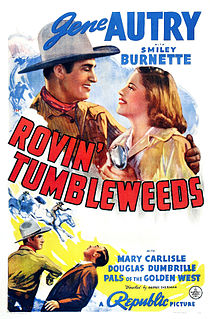
Rovin' Tumbleweeds is a 1939 American Western film directed by George Sherman and starring Gene Autry, Smiley Burnette and Mary Carlisle. Written by Betty Burbridge, Dorrell McGowan, and Stuart E. McGowan, the film is about a cowboy congressman who exposes a crooked politician who is delaying passage of a flood control bill.

The Singing Hill is a 1941 American Western film directed by Lew Landers and starring Gene Autry, Smiley Burnette, and Virginia Dale. Based on a story by Jesse Lasky Jr. and Richard Murphy, the film is about a singing cowboy and foreman of a ranch that may be sold to an unscrupulous banker by the young madcap heiress who is unaware that the sale will result in the local ranchers losing their free grazing land and their ranches. In the film, Autry introduced the song "Blueberry Hill" which would become a standard recorded by such artists as Louis Armstrong (1949), Fats Domino (1956), and Elvis Presley (1957). The song became one of Autry's best-selling recordings. In 1987, "Blueberry Hill" received an ASCAP Award for Most Performed Feature Film Standards on TV.

Stardust on the Sage is a 1942 American Western film directed by William Morgan and starring Gene Autry, Smiley Burnette, William Henry, and Edith Fellows. Written by Betty Burbridge, based on a story by Dorrell and Stuart E. McGowan, the film is about a singing cowboy who helps his fellow ranchers against a corrupt mine superintendent looking to steal the mine in which they've invested. The film soundtrack features two duets by Autry and Fellows, "When the Roses Bloom Again" and "I'll Never Let You Go, Little Darlin'". The final scene includes an innovative audience sing-along medley of the classics "You Are My Sunshine", "Home on the Range", and "Deep in the Heart of Texas", with Burnette conducting and the words appearing at the bottom of the screen.
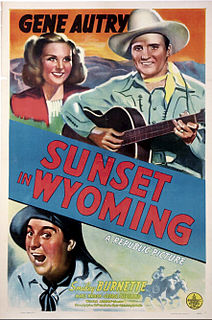
Sunset in Wyoming is a 1941 American Western film directed by William Morgan and starring Gene Autry, Smiley Burnette, George Cleveland, and Maris Wrixon. Based on a story by Joe Blair, the film is about a singing cowboy who goes up against a lumber company clearcutting the timber from a local mountain causing catastrophic flooding and endangering the lives of valley ranchers. The film features the songs "There's a Home in Wyomin'" and "Sing Me a Song of the Saddle".



















